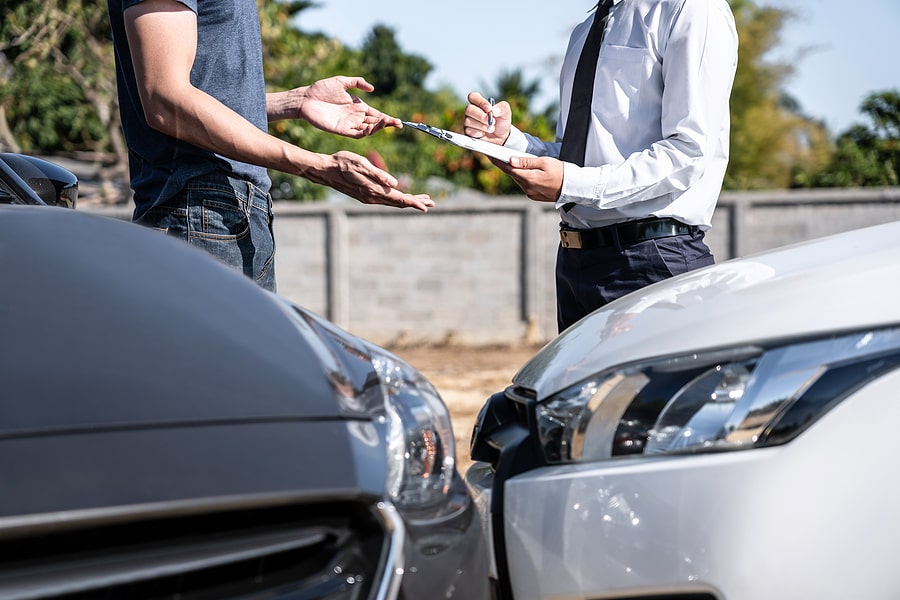When a negligent driver crashes into your car, the post-accident moments often become confusing and stressful. If you are like many accident victims, you feel a surge of stress, frustration, or outright anger. Although you have a legitimate right to feel these emotions, you take control and remain calm. Anything you say or do at an accident scene potentially affects you throughout the life of your claim.
The idea of taking a deep breath and doing what is necessary sounds clichés. Because every action you take is important, that is exactly what you must do.
Call 911
Vehicle and Traffic Codes in Texas and other states include similar accident reporting requirements. In most cases, you must contact the appropriate law enforcement agency when your accident involves injury, death, or disables your vehicle.
You must also:
- Provide aid to any injured person
- Call for medical assistance.
- Provide your driver’s license information
- Remain at the accident until law enforcement authorities arrive
If you or someone else needs emergency medical attention, tell the 911 operator during your initial call. This usually speeds up their arrival.
Think Before You Speak
Never admit fault or apologize. When you are involved in an accident, you become the center of everyone’s attention. People listen, remember, and repeat your words to anyone willing to listen.
If a witness hears a driver speak after an accident, they usually repeat the information to the police or any insurance investigator who contacts them. That is why you must think before you speak. You must never admit fault and never apologize for being involved in the accident. Apologies often come across as an admission of fault.
Why you should never admit fault
- When you admit that you are at fault, you are making a decision that insurance companies, attorneys, and courts usually make.
- Fault for an accident is often a complex legal conclusion. It often involves principles and concepts a typical driver might not recognize or understand.
- Even if you believe that you made an inappropriate move, you will not necessarily be 100 percent at fault.
- If you tell someone you are at fault immediately after an accident, your statement has a ring of truth. These types of post-accident statements often resurface during an insurance investigation, in future depositions, or during a trial.
Preserve the Evidence to Protect Your Interests
Accident scenes begin changing immediately. Drivers must move their cars if they are blocking traffic. Hit-and-run drivers speed away without identifying themselves. Witnesses disappear into a crowd, and ongoing traffic pushes physical evidence to the edge of the road. If you need these and other pieces of evidence to prove your case, you must document them before it is too late.
Your smartphone camera is the perfect tool for preserving accident details.
- Get a photo of the other person and their driver’s license and insurance card. Document their current address.
- Take a photo of the involved vehicles. Document the make, model, impact points, damage, and license plates.
- Get photos of the accident scene, including skid marks, debris in the street, traffic lights, etc.
- Get witnesses’ contact information.
- If you are seriously hurt and cannot move, ask someone to assist you.
Seek Medical Treatment For Your Injuries
After you sustain a car accident-related injury, your treatment (or lack of treatment) becomes a measure by which the liability insurer evaluates your claim value.
To properly document your injuries, you must get the medical treatment you need.
- Visit the emergency room: When your body endures a serious impact, visit your doctor or an emergency room for a comprehensive evaluation. If you do not feel pain immediately, get a precautionary check-up anyway. Return if you begin to feel discomfort.
- Follow your doctor’s orders: After a doctor examines you, do what they say. If they tell you to take time off work, take at least a few days to rest. If they give you a prescription, take it to the pharmacy and have them fill it. If your doctor prescribes physical therapy, schedule your appointments.
Report Your Accident to Your Insurer
When you have an accident in an insured vehicle, your insurance company requires that you make a report. Even if you believe you did not do anything wrong, your insurer has the right to reach this conclusion on their own.
They accomplish this by investigating your accident:
- Obtaining each driver’s accident version, police reports, and witness statements
- Conducting a site investigation
- Deciding sources of liability
- Hiring accident experts as necessary
- Establishing an uninsured motorist claim if you sustained an injury and the other driver has no insurance
- Defending you if the other party files a lawsuit against you
Your insurance policy commits your insurer to these and other actions. It also establishes rules you must follow to retain your coverage. If you do not make a timely report, your insurer cannot handle a claim on your behalf. If your delayed report jeopardizes your insurer’s rights, you also jeopardize your insurance coverage.
Track and Document Your Injury
A year from now, you will not remember all of your pain and many other details of your healing process. It is essential to document what you are feeling while you are going through your recovery.
Your documentation can help you and your attorney recall and understand your pain, suffering, and other issues when negotiating your claim.
Therefore:
- Create a journal to track your injury. It does not have to be fancy. It should simply have enough room to make daily notes.
- Document your emergency treatment, any surgical procedures, and any follow-up doctor visits.
- Document your daily difficulties: degree of pain, emotional issues, family and spousal complications, inability to work, physical limitations, etc.
Do Not Talk About Your Accident or Injuries
- The liability insurer must set a dollar reserve for your injuries. As described by the International Risk Management Institute, this is the estimated value of your unpaid claim. It is a legal obligation, so if you sustained serious injuries, they will do whatever it takes to get your injury information.
- Talk to your friends and neighbors
- Watch your home to see if, when, and how you come and go
- Record video footage of your activities
- Hire a social media investigator to track your online activities
- Run a credit report
Of course, you must comply with your own insurance company’s requests for information. If you prefer not to deal with them directly, give a personal injury attorney the authority to intervene on your behalf. Until you file a lawsuit, you have no obligation to provide medical bills, wage loss documentation, or even a recorded statement to the liability carrier.
To keep your information private, you should never talk about your accident and injuries with anyone but your immediate family, your insurer, or your legal representative. You should not share your activities or recovery status on Facebook, TikTok, YouTube, or any other social media platform.
Consult a Personal Injury Attorney Near You Today
When you sustain an injury, consider scheduling a complimentary consultation with a personal injury attorney. Attorneys use their firm’s resources to investigate your case, analyze any legal issues, and evaluate your injuries. They understand how insurance companies work and they will intervene on your behalf to protect your legal interests. When you are ready, your car accident attorney negotiates your claim and files a lawsuit if necessary.


